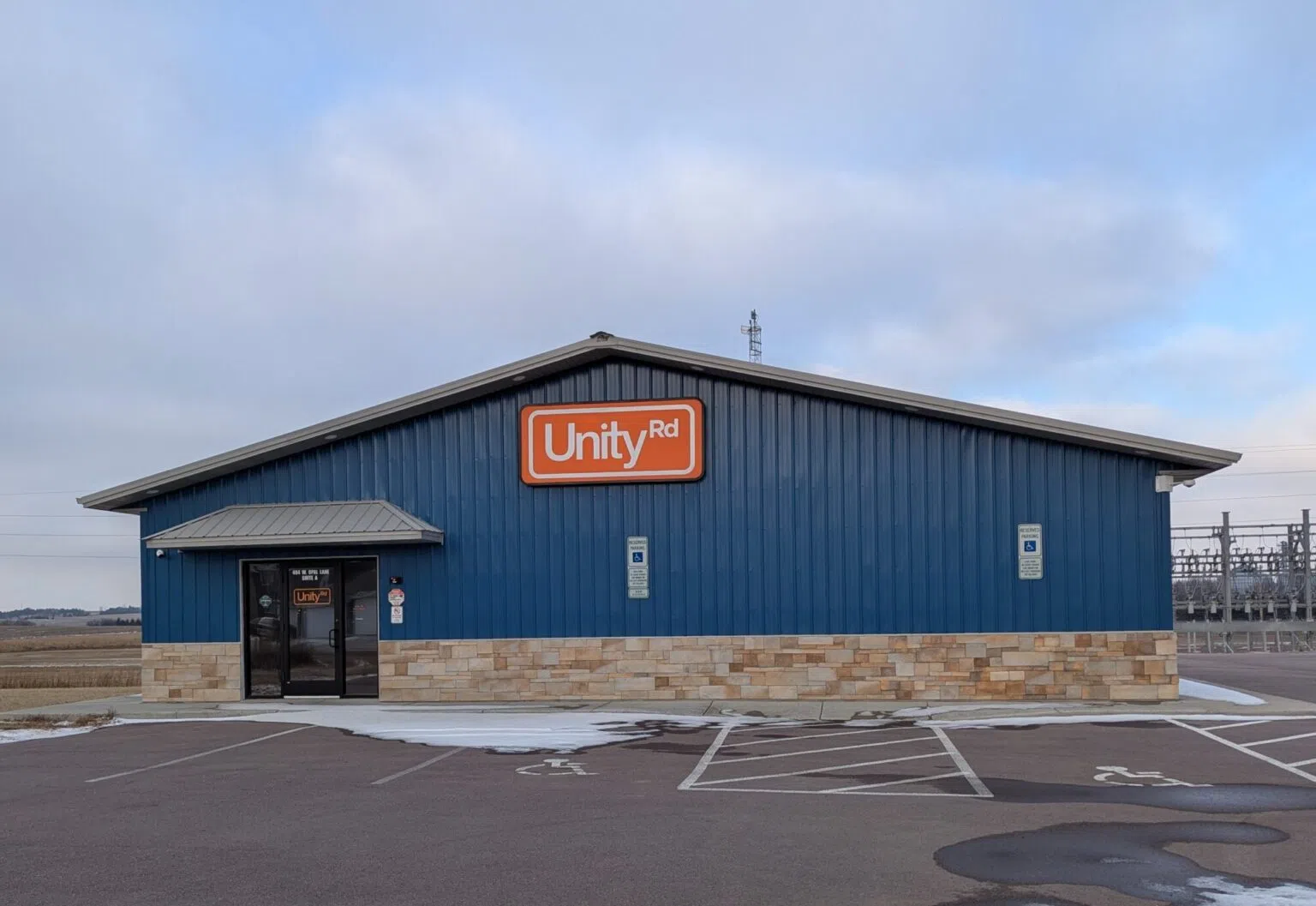
Unity Rd., a medical cannabis dispensary in Hartford, closed in November. (John Hult/South Dakota Searchlight)
SIOUX FALLS, S.D. (South Dakota Searchlight) – The trouble signs started about a year in.
B.J. Olson had opened his medical cannabis dispensary, called “Unity Rd.,” in the summer of 2022, less than a month after medical pot sales became legal in South Dakota.
That first month or two, things were fine. Olson’s revenue lined up nicely with his projections.
Then came the competition. Dispensaries were popping up all over the Sioux Falls metro area, which Olson serviced from his location in Hartford.
“Every time a new dispensary opened, it would be a little less and a little less,” Olson told South Dakota Searchlight in a recent interview. “Then it was a race to the bottom on pricing.”
Unity Rd. is one of at least eight dispensary businesses that had a license from the state Department of Health last winter but no longer does. An archived version of the state’s medical pot website from February listed 78 dispensaries on its licensing page. The December figure, listed on the current version of that same page, lists 70.
Meanwhile, the number of patient cardholders in the state has also been declining, from nearly 14,000 last winter to fewer than 12,000 currently.
The negative cardholder trend and a too-fast expansion of dispensaries were part of the problem for Olson’s Hartford shop. He said regulations were another part.
The state’s medical cannabis rules prohibit advertising. Social media posts deemed too close to advertising drew warnings from the state, Olson said. The price of an annual dispensary license from the state went up. He had to pay specialty accountants to do his taxes and five times the price of the tax preparation bill he was used to paying in his other business ventures.
Cannabis businesses cannot deduct most business expenses like rent or employee wages, but can deduct cost-of-business expenses. Threading that needle takes a tax preparer versed in the frequently shifting regulations on cannabis business rules.
“It was all the little things that added up,” Olson said.
Beyond messages about errant social media posts, there was the warning about a steel door between Olson’s medical cannabis shop and the separate smoke shop business he owned on the other side of his building.
Olson called the door “impassable,” but the state didn’t like that it had hinges. He responded by pulling the door out and installing what he described as an eighth-inch piece of plywood in the empty space to prove he’d physically closed off his medical pot business from his other shop, thereby complying with state rules.
“Even though I could literally put my fist through it, that was OK,” Olson said.
Had Initiated Measure 29 passed on Election Day and legalized the possession of recreational marijuana, Olson said, he’d still be in business. But it didn’t.
“I was ready to go for the ride,” said Olson, who expected it would’ve taken another two years for lawmakers to set up a legal retail market.
Instead, Olson announced in November he’d be closing both his medical cannabis dispensary and his smoke shop. The market is oversaturated, he said, and it’s not worth the hassle.
“I’d already put four years into it,” Olson said. “I wanted to be done with it.”
Handful of closures, more expected
Joe Stavig, chief financial officer of Dakota Herb’s dispensary and cultivation business, has heard about other dispensary closures since the failure of IM 29 at the ballot box in November.
Stavig is hopeful in one way about the future of the medical marijuana industry in the state. At least some of the people who’d held off on seeking medical pot cards in hopes voters would legalize recreational marijuana might apply for cards now.
Even so, Stavig said, the dropping patient numbers have already done financial damage to the industry.
“What we’re seeing is some of these smaller dispensaries closing down, and even potentially some smaller cultivators shutting down, because of what we’ve seen over the last six months with the patient card count,” Stavig said.
Cardholders peaked in February of 2024 at 13,705. This month, that number is 11,635 – a 15% drop.
Alan Welsh, a Dakota Herb co-founder and former Highway Patrol leader, puts at least some of the blame on the increasing availability of pot alternatives like hemp-derived gummies and smokable flower.
Welsh and Stavig like their chances because their company is vertically integrated with cultivation, wholesaling and dispensaries. But Welsh can’t see standalone dispensaries competing against smoke shops selling weed-like products with similar effects. Those shops capitalized on a legal loophole in the 2018 federal farm bill to sell products derived from hemp by synthesizing intoxicants found in small amounts in hemp and adding enough to create high-inducing products.
The Legislature passed a bill last winter to bar the sale of weed alternatives, but the law is being challenged in court, and Welsh, Stavig and Olson said the law has done little so far to stem the flow of those products.
“There might be some kind of enforcement coming, but it’s never been enforced,” Welsh said.
Olson, for his part, said that by offering those products at his smoke shop, he was competing with his medical marijuana dispensary.
“All of these smoke shops that are open all throughout the state of South Dakota, myself included, that’s selling legal weed,” Olson said. “It’s 100% selling legal weed. There’s no regulation. I can buy product from anywhere in the country, have it shipped to me and sell it.”
Other things could also be done to boost card numbers, said Stavig, of Dakota Herb. He intends to advocate for expanding the list of qualifying conditions for a patient card, and for the addition of an industry representative to the state’s Medical Marijuana Oversight Council.
Regulation issues shutter one shop
The state Department of Health has yet to respond to a South Dakota Searchlight email regarding cease and desist letters, warnings and enforcement actions against state dispensaries.
But Roy Nielsen, owner of a cultivation facility and dispensaries in Sioux Falls and Yankton, is familiar with at least four of them. The Roy’zzz license for its Sioux Falls-based dispensary is on hold until a January hearing, Nielsen said, over its alleged violations of cannabis program rules.
One of the violations, he said, came when a dispensary employee posted an image of cannabis use to their Snapchat story, which disappeared in 24 hours and was only visible to that employees’ Snapchat friends.
Even though the employee wasn’t acting as an employee, Nielsen said, the company caught a cease and desist letter over the post.
One administrative program rule prohibits social media posts that depict the use of cannabis.
Another came because someone at the Sioux Falls shop had jokingly put a Scooby-Doo mask on a mannequin in the entry area between the shop’s front doors and its cardholder-access-only dispensary area.
Another program rule prohibits “using cartoons, toys, or other products or images commonly associated with or marketed to individuals under 21 years of age.”
“The state came in and took a picture,” said Nielsen, who spent decades selling medication for pets in Iowa before switching to the cannabis business. “It was like a cartoon character.”
Nielsen said shutting down the shop until January put him and his employees in a tough spot for the holidays.
“I care about my people,” Nielsen said. “I’ve got to figure out how to pay them.”
A sign on the front door of the Roy’zzz medical cannabis storefront in Sioux Falls. The dispensary closed as its owners awaited a hearing on alleged violations of South Dakota’s medical cannabis rules. (John Hult/South Dakota Searchlight)
Like Stavig and Olson, Nielsen said he’s hoping to survive what he expects will be a wave of dispensary consolidations in South Dakota. He’s hired a medical director to help educate patients and anyone else who’ll listen about the benefits of well-regulated medical cannabis.
But he’s also not holding his breath for a more welcoming environment. At this point, he’s thinking about Minnesota, a neighboring state in the process of setting up a recreational market.
In his previous life as a pet med purveyor, Nielsen said, he grew accustomed to working with regulators on matters of safety, efficacy and drug testing.
“We dealt with the Department of Ag, the EPA, the FDA,” Nielsen said. “Nothing’s been harder for me to navigate than the Department of Health.”
Olson, the former Hartford dispensary owner who claims to have gone from “one of the first dispensaries open to one of the first ones to close,” offered a similar sentiment. It wasn’t just the tax issues or the competition or the state’s concerns about how he kept his smoke shop and pot shop separate.
South Dakota touts itself as business friendly, but Olson said he never felt that love as a dispensary owner.
“They were always in our back pocket, always making us fearful of this, that or the other,” Olson said. “No other industry has to live in fear like that.”




Comments